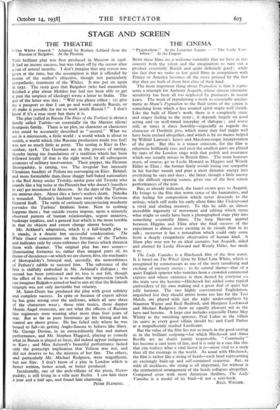STAGE AND SCREEN
THE THEATRE
This brilliant play was first produced in Moscow in 1926. It had an instant success, but was taken off by the censor after a run of several months. I don't imagine that any reason was given at the time, but the assumption is that it offended by reason of the author's objective, though not particularly sympathetic, treatment of the Whites. It was put on again in 1932. The story goes that Bulgakov (who had meanwhile finished a play about Moliere but had not been able to get it past the umpires of ideology) wrote a letter to Stalin. The gist of the letter was this : " Will you please either : (a) give me a passport so that I can go and work outside Russia, or (b) make it possible for me to work inside Russia ? " I don't knovi if it's a true story but there it is.
The play (called in Russia The Days of the Turbins) is about a
family called Turbin—an essentially (in the Marxist idiom) bourgeois family. There is no plot, no character or characters who could be accurately described as " central." What we see is a microcosm, a little world : a world which is about to vanish, a world which (the Russian production made you feel) was not so much little as petty. The setting is Kiev in De- cember, 1918. The Germans are in the process of ratting, thereby laying the foundations of a tradition which has been followed loyally (if that is the right word) by all subsequent amateurs of military intervention. Their puppet, the Hetman Skoropadsky, is ratting, too. The irregular but intensely Ukrainian banditti of Petlura are converging on Kiev. Behind, and more formidable than, these shaggy half-baked nationalists is the Red Army under Trotsky, under poor old Trotsky who sounds like a big noise at the Phoenix but who doesn't (needless to say) get mentioned in Moscow. So the days of the Turbins are anxious days. Alexei dies a hero's useless death. Nikolka is wounded. Yeliena's husband runs away with the German General Staff. The rattle of curiously unconvincing musketry, pervades the Turbins' fatalistic home. Next to nothing happens there ; but outside events impose, upon a minutely observed pattern of human relationships, urgent anxieties, bankrupt loyalties, and a general fear which is the more terrible in that its objects and extent change almost hourly.
Mr. Ackland's. adaptation, which is a full-length play as it stands, is a drastic but successful condensation. The White Guard concentrates on the fortunes of the Turbins and indicates only by cross-reference the forces which threaten them with disaster. The original play has two scenes— illuminating footnotes to, rather than integral parts of, its theme of decadence—in which we are shown, first, the mechanics of Skoropadsky's betrayal and, secondly, the unworthiness of Petlura's rabble to succeed him. The substance of the first is skilfully embodied in Mr. Ackland's dialogue ; the second has been jettisoned and its loss is not felt, though the effect of its absence is to weaken the impression (which one imagines Bulgakov aimed or had to aim at) that the Bolshevik triumph was not only inevitable but salutary.
M. Saint-Denis has produced the play with great subtlety and complete success. In spite or because of expert advice he has gone wrong over the uniforms, which all save three of the characters wear ; those trim tunics, those dapper Morris Angel overcoats, are not what the officers of Russian line regiments were wearing after more than four years of war. But as far as pure histrionics go his timing and his control are above praise. He has failed only where he was bound to fail—in getting Anglo-Saxons to behave like Slays. Mr. George Devine, in an extraordinarily fine and mature performance, and Mr. Stephen Haggard, playing as comedy what in Russia is played as farce, did indeed appear indigenous to Kiev ; and Miss Ashcroft's beautiful performance lacked only the postscript implication that Yeliena was not, and did not deserve to be, the mistress of her fate. The others, and particularly Mr. Michael Redgrave, were magnificent, but not Slay. I don't know of a play in London which is better written, better acted, or better produced.
Incidentally, one of the arch-villains of the piece, Skoro- padsky, is still living in a villa near Berlin. I saw him there a year and a half ago, and found him charming.
PETER FLEMING.


















































 Previous page
Previous page